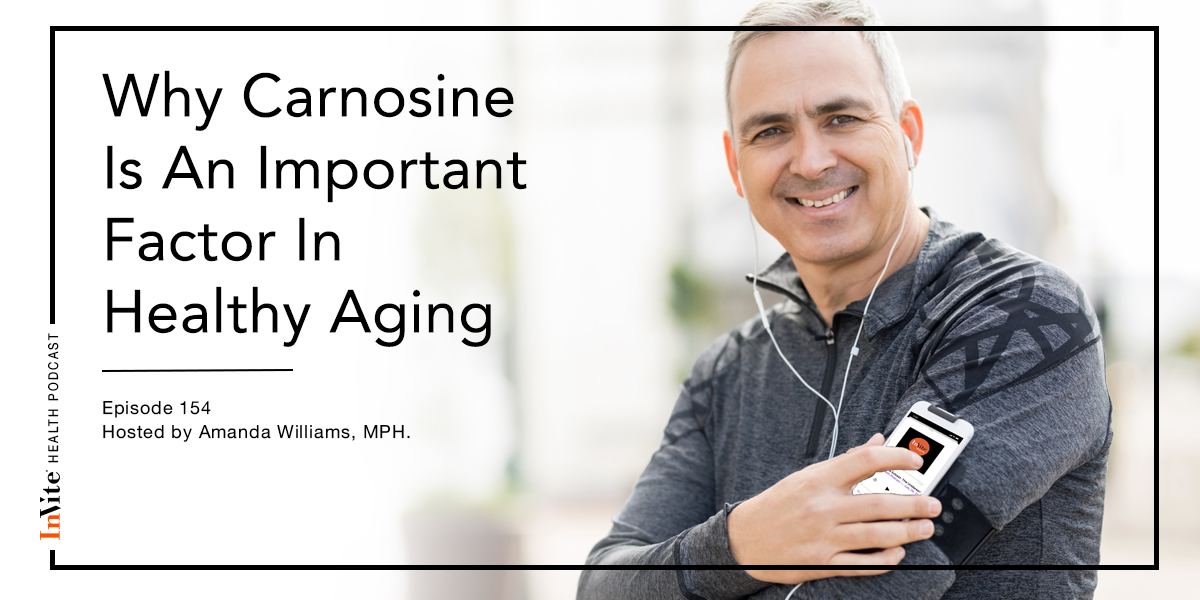Why Carnosine Is An Important Factor For Healthy Aging – Invite Health Podcast, Episode 154

Invite Health Podcast, Episode hosted by Amanda Williams, MPH.
Subscribe Today!
One of the things that we know about the aging process is that certain enzymes, amino acids, neurotransmitters, and pathways start to diminish in terms of their normal activity as we get older. We can look at digestive enzymes for example; as we get older, our body produces less digestive enzymes as opposed to when we were 20 years old. This is why old people have a difficult time digesting certain foods. So what can we do to replenish these nutrients, enzymes, amino acids and more? There is one dipeptide that I want to talk to you about that can help, called Carnosine.
What role does Carnosine play in the body?
Carnosine is really interesting. It is found throughout your entire body and is a di-peptide, or a combination or two amino acids. With carnosine, what you have is a combination of beta-alanine along with histidine. Carnosine is especially found in high energy demand areas, including the heart, brain, and skeletal muscle. But as we age, levels begin to decline because our bodies make less Carnosine but also because it seems to become increasingly vulnerable to destruction as we age.†
Support Cellular Health With This Energy-Producing Powerhouse. Learn More >>
Carnosine also protects us from glycation, which can be extremely damaging. When you have too much sugar in your system, it bombards your body’s cells and hitches onto fats and proteins in a process known as glycation. This forms advanced glycation end products, or AGEs, which cause protein fibers to become stiff and malformed. But glycation is not only a factor for diabetes; it can happen to anyone. If this can occur in anyone and is dependent on levels of Carnosine, it is important to make sure you have adequate levels in your body to fight it off as best as possible.†
The Science Behind Carnosine
When thinking about anti-aging, carnosine plays an important role. Other than working against glycation, this dipeptide works as a powerful antioxidant. This allows our bodies to fend off oxidative stress and protect our cells. We also know, based off of scientific research, that it can help to lengthen the lifespan of our cells.†
Telomeres are the end caps of the chromosomes. This is one way we can assess the aging process of the cell itself – by measuring the length of the telomere. If the telomere begins to shorten, this means that the lifespan of that particular cell. This can be impeded by having carnosine; it actually protects that chromosomal end cap from the damaging effects that the cell can be exposed to. One way to know how well you are aging is to test how well your cells are aging. A Cellular Aging Test can help you determine your cellular age by measuring the protective end caps of your DNA (called Telomeres) to compare your cellular age to your actual age in order to determine if you’re aging faster than normal. This Panel can also help evaluate how your diet and exercise changes are impacting your quality of life.
A study published in the journal Stroke from English researchers looked at the safety and efficacy of carnosine as a neuro-protective agent in ischemic strokes. It was found that the carnosine actually exhibited significant cerebral protection, or brain cell protection, against functional damage as well as histological damage.
Thank you for tuning in to the Invite Health Podcast. You can find all of our episodes for free wherever you listen to podcasts or by visiting www.invitehealth.com/podcast. Make sure you subscribe and leave us a review! Follow us on Facebook, Twitter and Instagram at Invite Health today. We’ll see you next time on another episode of the Invite Health Podcast.


